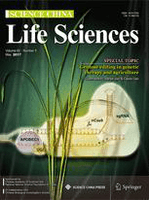
Frontiers in Genome Editing
Scope & Guideline
Catalyzing Breakthroughs in Biotechnology and Genetics
Introduction
Aims and Scopes
- Agricultural Genome Editing:
Research aimed at enhancing crop traits such as resistance to diseases, improved yield, and nutritional quality through genome editing technologies like CRISPR/Cas9. - Therapeutic Genome Editing:
Exploration of gene editing as a therapeutic approach for various genetic disorders, including the development of gene therapies targeting blood disorders and neurological diseases. - Innovative Editing Technologies:
Development and application of novel genome editing tools and techniques, including base editing, prime editing, and CRISPR variations, to improve specificity and efficiency. - Regulatory and Ethical Considerations:
Discussion of regulatory frameworks, public perception, and ethical considerations surrounding the use of genome editing technologies in food production and clinical applications. - Environmental Applications:
Investigation of the use of genome editing in environmental biotechnology, including potential applications in microbial systems and bioremediation.
Trending and Emerging
- Food Security and Agricultural Sustainability:
A significant increase in research focused on using genome editing to enhance food security, especially in developing regions, underscores the urgent need for sustainable agricultural practices. - CRISPR Applications in Biomedical Research:
Growing interest in CRISPR technology's applications for therapeutic interventions in genetic disorders, highlighting its potential for precision medicine. - Environmental Biotechnology:
Emerging research on the application of genome editing in environmental contexts, such as improving microbial capabilities for bioremediation and other ecological applications. - Public Perception and Ethical Issues:
An increasing number of studies addressing societal and ethical implications of genome editing technologies, reflecting the need for public engagement and informed policy-making. - Integration of Computational Tools in Genome Editing:
The rise of computational biology and bioinformatics in genome editing research is becoming more prominent, aiding in the design and prediction of editing outcomes.
Declining or Waning
- Traditional Genetic Modification Techniques:
Research focusing on older genetic modification methods is declining as genome editing technologies like CRISPR become more mainstream and effective. - General Plant Breeding Practices:
The focus on conventional plant breeding techniques is waning in favor of more precise and efficient genome editing strategies that offer specific trait enhancements. - Non-Genome Editing Approaches in Medicine:
Interest in non-genome editing therapeutic approaches is diminishing as the efficacy and potential of genome editing techniques for treating diseases gain more attention. - Basic Research on Model Organisms:
Research centered on basic genetic studies in traditional model organisms is less emphasized as there is a shift towards applied research that addresses real-world challenges in agriculture and medicine.
Similar Journals

Plant Reproduction
Exploring the Future of Plant Reproductive BiologyPlant Reproduction is an esteemed academic journal published by Springer, dedicated to advancing the understanding of reproductive processes in plants. With its ISSN 2194-7953 and E-ISSN 2194-7961, this journal serves as a vital resource for researchers and professionals in the fields of cell biology and plant science. Since its inception in 2013, it has been recognized in the Q1 Quartile for plant science, underscoring its significance and impact within the academic community, while maintaining a ranking of #79/516 in the Scopus database for agricultural and biological sciences. The journal embraces an Open Access model, enhancing accessibility for a broader audience of scholars and practitioners. As we continue to converge our research efforts towards 2024 and beyond, Plant Reproduction remains committed to exploring innovative findings and fostering collaboration in plant reproductive biology, thereby contributing significantly to the global understanding of plant systems and their ecological impacts.

CURRENT ISSUES IN MOLECULAR BIOLOGY
Fostering Dialogue in Molecular Biology's Dynamic LandscapeCURRENT ISSUES IN MOLECULAR BIOLOGY, published by MDPI, serves as an essential forum for researchers and professionals in the rapidly evolving field of molecular biology. Established in 1999 and operating under an Open Access model, this journal not only shares high-quality research but also encourages a vibrant exchange of ideas across various disciplines, including medicine and microbiology. With an impressive trajectory leading into 2024, it has earned its place in the Q2 quartile for both Medicine (miscellaneous) and Microbiology, emphasizing its relevance and impact in these areas. The journal’s commitment to disseminating cutting-edge findings is reflected in its diverse coverage of topics, from molecular genetics to microbial interactions. Operating from its home base in Basel, Switzerland, CURRENT ISSUES IN MOLECULAR BIOLOGY is positioned to contribute significantly to the academic landscape, making it indispensable for those seeking to advance their understanding and research within the life sciences.

TRANSGENIC RESEARCH
Advancing the Frontiers of Genetic InnovationTRANSGENIC RESEARCH, an esteemed academic journal published by Springer, has been at the forefront of the fields of agronomy, animal science, and biotechnology since its inception in 1991. With an ISSN of 0962-8819 and an E-ISSN of 1573-9368, this journal is pivotal in disseminating cutting-edge research and innovative methodologies that pave the way for advancements in genetic engineering and transgenic technology. Ranked in the Q2 category for Agronomy and Crop Science, Animal Science and Zoology, and Biotechnology, and within the top 90th percentile in Scopus for several related categories, TRANSGENIC RESEARCH maintains a prominent position in the global scientific community. This journal serves as a vital resource for researchers, professionals, and students, providing a platform for papers that explore both fundamental and applied aspects of transgenic research, ultimately contributing to sustainable agricultural practices and environmental stewardship. The journal’s commitment to fostering dialogue and collaboration among experts makes it an essential read for anyone interested in pushing the boundaries of genetic research.

FUNCTIONAL & INTEGRATIVE GENOMICS
Innovating Insights into Genetic IntegrationFUNCTIONAL & INTEGRATIVE GENOMICS, published by Springer Heidelberg, is a leading journal in the fields of genetics and molecular biology. Established in 2000, it serves as a pivotal platform for advancing our understanding of genomic functionality and integration, making significant contributions to both basic and applied research in genetics. With a robust impact factor and a ranking in the Q3 quartile for Genetics and Q2 for Medicine (Miscellaneous), the journal aims to publish innovative research that explores the relationships between genomic data and biological functions, appealing to a diverse audience of researchers and professionals. Although it operates under a subscription model, the journal's extensive archives remain a valuable resource for academics seeking to stay abreast of the latest findings and methodologies in genomics. As the field evolves, FUNCTIONAL & INTEGRATIVE GENOMICS remains committed to fostering scholarly dialogue and the dissemination of groundbreaking studies that influence future research trajectories.

aBIOTECH
Connecting scientists to shape the future of biotechnological applications.aBIOTECH, published by SPRINGERNATURE, is a premier academic journal dedicated to advancing the fields of biotechnology, agronomy, and molecular biology. With an impressive ISSN of 2096-6326 and E-ISSN 2662-1738, this journal has established itself as a vital resource for researchers and professionals aiming to publish high-quality, impactful studies. Based in Singapore, aBIOTECH has achieved remarkable recognition, boasting a Q1 ranking in multiple categories including Agronomy and Crop Science, Biochemistry, and Genetics in the 2023 Scopus rankings. Its solid position in the 90th percentile for Biochemistry and Genetics reinforces its significance within the global scientific community. The journal covers a broad spectrum of topics relevant to both basic and applied research, facilitating a shared dialogue amongst scientists and encouraging collaborative progress in innovative biotechnological applications. The open-access nature of the journal ensures that cutting-edge research is freely available, fostering a global exchange of ideas that is critical to the advancement of science today.

GENOME BIOLOGY
Illuminating the pathways of molecular biology and bioinformatics.GENOME BIOLOGY is a premier, peer-reviewed journal published by BMC, focusing on the rapidly evolving fields of genomics, molecular biology, and bioinformatics. Accessible as an Open Access journal since 2000, it aims to disseminate high-quality, cutting-edge research that contributes to our understanding of genome biology's intricate mechanisms. The journal boasts an impressive impact, ranking 8th in Agricultural and Biological Sciences and 9th in Biochemistry, Genetics and Molecular Biology, highlighting its significance among scholars, professionals, and students alike. With a commitment to facilitating the exchange of invaluable scientific knowledge, GENOME BIOLOGY provides an important platform for discussions on evolutionary biology, genetic systems, and cell biology, contributing to the advancement of these dynamic disciplines.

Cells
Connecting Scientists to the Latest in Cellular DiscoveriesCells, published by MDPI in Switzerland, is a leading open-access journal that has been disseminating groundbreaking research in the fields of Biochemistry, Genetics, and Molecular Biology since its inception in 2011. With an impressive E-ISSN of 2073-4409, the journal boasts a strong impact factor and ranks in the 84th percentile for Scopus ratings, underscoring its significance in advancing scientific knowledge. As a Q1-ranked journal in both 2023 and 2020, it serves as a premier platform for researchers, professionals, and students eager to explore innovative findings and methodologies. By providing unrestricted access to high-quality research, Cells plays a pivotal role in facilitating collaboration and inspiration within the global scientific community, making it an indispensable resource for anyone interested in cutting-edge discoveries in cellular biology.

Horticulture Research
Fostering collaboration in the world of plant science.Horticulture Research, published by Oxford University Press Inc, is a leading open-access journal dedicated to advancing knowledge in the fields of horticulture, plant science, and related biotechnological disciplines. Since its inception in 2014, the journal has rapidly established itself as a premier outlet for research, boasting prestigious Q1 rankings across multiple categories including Biochemistry, Biotechnology, Genetics, Horticulture, and Plant Science in 2023. With exceptional Scopus rankings—placing it in the top 2% of Horticulture journals and 4% for Plant Science globally—Horticulture Research provides a vital platform for scholars, professionals, and students to disseminate and engage with innovative findings. Emphasizing the importance of open accessibility, the journal allows for widespread dissemination of impactful research, making it an invaluable resource for those striving to enhance sustainable horticultural practices and plant-based innovations. Its aim to bridge the gap between theoretical study and practical application reflects the dynamic nature of the horticultural sciences today.

Science China-Life Sciences
Pioneering discoveries that shape our understanding of life.Science China-Life Sciences, published by SCIENCE PRESS, is a premier academic journal that stands at the forefront of innovative research and discoveries in the fields of life sciences, spanning crucial areas such as agricultural and biological sciences, biochemistry, genetics, molecular biology, and environmental science. With an impressive Q1 ranking in its respective categories—ranked #5 in Agricultural and Biological Sciences, #7 in Environmental Science, and #17 in Biochemistry, Genetics and Molecular Biology—this journal is recognized for its rigorous peer-review process and significant impact within the scientific community, as reflected in its high percentiles (97th and 92nd). Maintained as an Open Access publication, it ensures broad dissemination and accessibility of research findings, fostering collaboration and knowledge sharing among researchers, professionals, and students alike. Given its position in the research landscape and its commitment to high-quality scholarship, Science China-Life Sciences plays a vital role in advancing life sciences research, supporting scientists in addressing global challenges through innovative biological solutions.

BMB Reports
Innovative Research, Open Access InsightsBMB Reports is a distinguished open-access journal published by the Korean Society of Biochemistry & Molecular Biology since 2008, making significant contributions to the fields of biochemistry, molecular biology, and medicine. With a current impact factor that positions it in the Q2 category for Biochemistry and Q1 for Miscellaneous Medicine, this journal supports a wide dissemination of high-quality research findings, fostering robust dialogue among researchers, professionals, and students alike. Based in Seoul, South Korea, BMB Reports aims to publish innovative studies that advance our understanding of biochemical and molecular processes, thus shaping the future of health and medicine. The journal's commitment to open access enhances the visibility of its articles, allowing for greater accessibility and engagement in the scientific community. With notable rankings in both the Biochemistry and Molecular Biology categories, BMB Reports stands as a vital resource for those seeking to stay at the forefront of research in these rapidly evolving disciplines.